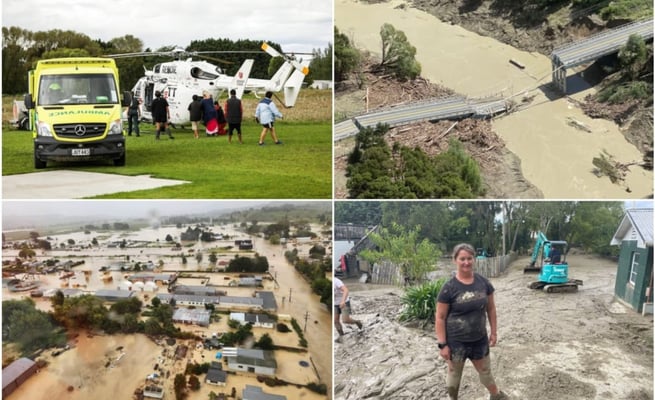Supporting communities in aftermath of Cyclone Gabrielle

This week saw Cyclone Gabrielle wreaking havoc across New Zealand’s North Island and sparking evacuations, rising flood waters and power outages across the North Island. Cyclone Gabrielle has left the East Coast is grappling with the aftermath, causing distress and logistical challenges for thousands of people. Reportedly at least 10,500 people have been displaced; thousands are sheltering in Civil Defence centres, and around 144,000 properties are still without power.
As of Thursday morning, the authorities are making massive efforts to restore essential services to thousands of people in Tairawhiti and Hawke's Bay, which have been worst hit by Cyclone Gabrielle.
It has been reported that Cyclone Gabrielle caused significant destruction resulting in the confirmed deaths of five people. The settlement of Eskdale in Hawke's Bay saw a child caught in rising waters, a woman was killed in a landslide, a body was discovered on the shore at Bay View, and another body, believed to have been caught in flood waters, was found in Gisborne. Furthermore, on Wednesday, the body of a volunteer firefighter who had been missing since Monday night in Muriwai, near Auckland, was recovered. By Wednesday, more than 1400 people had been reported as uncontactable using the police 105 online reporting form, mainly in Hawke's Bay and Tairawhiti.
Police have also confirmed they held "grave concerns" for several people missing in the Hawke's Bay and Tairawhiti areas.
The Defence Force is expected to move a water treatment facility to Wairoa, and Engineers and roading crews are checking bridges and clearing roads throughout both regions.
On Thursday morning, Hawke's Bay Civil Defence controller Iain Macdonald told media that Wairoa remained completely isolated and was a real area of concern as there were issues with food, fuel and water availability and that the main focus would be on establishing contact with isolated communities.
Meanwhile, Civil Defence confirmed that the power outage in Napier could last up to at least two weeks. Napier City Council has connected generators to drinking water supplies, but residents are still urged to conserve water as it is only a temporary fix.
Community organisations have again come forward to help those impacted by Cyclone Gabrielle.
Indian Weekender spoke to prominent community leaders to know what has been done by community organisations in this time of need.
If one talks about the Auckland region, the Waitakere region has been one of the most impacted areas. Speaking to Indian Weekender, Sunil Kaushal, President of the Waitakere Indian Association, says, "The disruption caused by cyclone Gabrielle is immense. Even I do not have power at my house in Henderson for the past few days. I have been regularly getting calls from people who have been impacted by the severe weather. While some need food, some need shelter, and some need blankets. As a community association, we are doing as much as we can to support them. Our association and volunteers are making hot food and distributing it to those affected, along with other essentials."

Narendra Bhana, President of New Zealand Indian Central Association Inc (NZICA), is also providing full support to the community members across North Island. "We have received several phone calls from devastated people looking for shelter and food. Our thoughts are with communities in Napier, Hastings and the wider Hawkes Bay region. NZICA is working with Red Cross New Zealand, Civil Defence and Plunkett Society to see how best we can support these communities.”
Jeet Suchdev, chairman of Bhartiya Samaj Charitable Trust, confirmed that they, along with other organisations, have stepped up and working round the clock to support those who the cyclone has impacted. He said, "Cyclone Gabrielle has deeply impacted New Zealanders and has left them with many problems to deal with. Morale of people is down. But it has also brought humanity forward as we have seen people going out of their way to support each other. Bhartiya Samaj, along with Auckland Indian diaspora and other pan African organisations, has been working tirelessly and reaching out to people in this time of emergency and providing them with groceries, essentials and other things including medicines that they need.”


This week saw Cyclone Gabrielle wreaking havoc across New Zealand’s North Island and sparking evacuations, rising flood waters and power outages across the North Island. Cyclone Gabrielle has left the East Coast is grappling with the aftermath, causing distress and logistical challenges for...
This week saw Cyclone Gabrielle wreaking havoc across New Zealand’s North Island and sparking evacuations, rising flood waters and power outages across the North Island. Cyclone Gabrielle has left the East Coast is grappling with the aftermath, causing distress and logistical challenges for thousands of people. Reportedly at least 10,500 people have been displaced; thousands are sheltering in Civil Defence centres, and around 144,000 properties are still without power.
As of Thursday morning, the authorities are making massive efforts to restore essential services to thousands of people in Tairawhiti and Hawke's Bay, which have been worst hit by Cyclone Gabrielle.
It has been reported that Cyclone Gabrielle caused significant destruction resulting in the confirmed deaths of five people. The settlement of Eskdale in Hawke's Bay saw a child caught in rising waters, a woman was killed in a landslide, a body was discovered on the shore at Bay View, and another body, believed to have been caught in flood waters, was found in Gisborne. Furthermore, on Wednesday, the body of a volunteer firefighter who had been missing since Monday night in Muriwai, near Auckland, was recovered. By Wednesday, more than 1400 people had been reported as uncontactable using the police 105 online reporting form, mainly in Hawke's Bay and Tairawhiti.
Police have also confirmed they held "grave concerns" for several people missing in the Hawke's Bay and Tairawhiti areas.
The Defence Force is expected to move a water treatment facility to Wairoa, and Engineers and roading crews are checking bridges and clearing roads throughout both regions.
On Thursday morning, Hawke's Bay Civil Defence controller Iain Macdonald told media that Wairoa remained completely isolated and was a real area of concern as there were issues with food, fuel and water availability and that the main focus would be on establishing contact with isolated communities.
Meanwhile, Civil Defence confirmed that the power outage in Napier could last up to at least two weeks. Napier City Council has connected generators to drinking water supplies, but residents are still urged to conserve water as it is only a temporary fix.
Community organisations have again come forward to help those impacted by Cyclone Gabrielle.
Indian Weekender spoke to prominent community leaders to know what has been done by community organisations in this time of need.
If one talks about the Auckland region, the Waitakere region has been one of the most impacted areas. Speaking to Indian Weekender, Sunil Kaushal, President of the Waitakere Indian Association, says, "The disruption caused by cyclone Gabrielle is immense. Even I do not have power at my house in Henderson for the past few days. I have been regularly getting calls from people who have been impacted by the severe weather. While some need food, some need shelter, and some need blankets. As a community association, we are doing as much as we can to support them. Our association and volunteers are making hot food and distributing it to those affected, along with other essentials."

Narendra Bhana, President of New Zealand Indian Central Association Inc (NZICA), is also providing full support to the community members across North Island. "We have received several phone calls from devastated people looking for shelter and food. Our thoughts are with communities in Napier, Hastings and the wider Hawkes Bay region. NZICA is working with Red Cross New Zealand, Civil Defence and Plunkett Society to see how best we can support these communities.”
Jeet Suchdev, chairman of Bhartiya Samaj Charitable Trust, confirmed that they, along with other organisations, have stepped up and working round the clock to support those who the cyclone has impacted. He said, "Cyclone Gabrielle has deeply impacted New Zealanders and has left them with many problems to deal with. Morale of people is down. But it has also brought humanity forward as we have seen people going out of their way to support each other. Bhartiya Samaj, along with Auckland Indian diaspora and other pan African organisations, has been working tirelessly and reaching out to people in this time of emergency and providing them with groceries, essentials and other things including medicines that they need.”











Leave a Comment